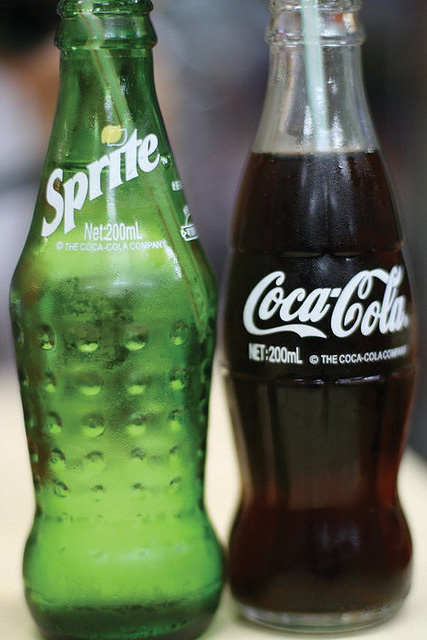This is “Case Studies”, section 11.5 from the book Business Ethics (v. 1.0). For details on it (including licensing), click here.
For more information on the source of this book, or why it is available for free, please see the project's home page. You can browse or download additional books there. To download a .zip file containing this book to use offline, simply click here.
11.5 Case Studies
Holly Madison for PETA

Source: Photo courtesy of Alisha Vargas, http://www.flickr.com/photos/alishav/3461411273/.
PETA (People for the Ethical Treatment of Animals) is an animal rights organization. According to their website, “PETA focuses its attention on the four areas in which the largest numbers of animals suffer the most intensely for the longest periods of time: on factory farms, in the clothing trade, in laboratories, and in the entertainment industry.”“Our Mission Statement,” PETA (People for the Ethical Treatment of Animals), About, accessed June 1, 2011, http://www.peta.org/about/index.asp.
Both an organization and a cause, PETA depends on public attention and donations. Attention is necessary because raising consciousness about animal suffering is more or less a prerequisite to fighting against it. Nearly all companies causing animal suffering as part of their daily business struggle mightily to hide it from their consumers: what’s not seen, the reasoning goes, isn’t a problem. PETA wants cruel animal treatment to be seen.
Donations are also necessary because PETA is a nonprofit. Many people give cash, but some give their time and themselves. Celebrities can be especially helpful given their ability to generate interest and grab attention in a noisy world. One celebrity participant is the Hollywood actress Alicia Silverstone. In August of 2010, she was featured in a video on PETA’s home page. Here’s the accompanying text: “Sexy Hollywood star Alicia Silverstone bares all in PETA’s first ever naked veggie testimonial, shot by acclaimed director Dave Meyers.”PETA (People for the Ethical Treatment of Animals) home page, accessed June 1, 2011, http://www.peta.org. Screenshot of PETA homepage featuring Alicia Silverstone from Business Ethics Workshop, http://businessethicsworkshop.com/Chapter_11/peta.html.
Much of the video is shot in slow motion. Silverstone pulls herself out of a swimming pool, leans into the camera, holds it with her smoky eyes, and talks about the advantages of being a vegetarian. No clothes are visible.“I am an Actor and I am a Vegetarian: Now Featuring Alicia Silverstone,” PETA (People for the Ethical Treatment of Animals), Vegetarian Testimonials, accessed June 1, 2011, http://veggietestimonial.peta.org/psa.aspx?CID=8ce2420c-021c-49bc-91c5-b02a8775e2a2.
Questions
-
Alicia Silverstone praises the virtues of vegetarianism nude. Do you believe this is an example of product sincerity—that is, of openness and honesty about what’s being sold?
- What is the product here?
- What elements of its presentation might seem insincere?
- What elements of its presentation might seem sincere?
- On balance, why do you believe the short video is sincere or insincere?
-
Almost certainly some people watched this video because they wanted to see a nude woman.
- What is a prurient interest?
- Make the case that this video promotes a prurient interest.
- Assuming the video promotes a prurient interest, who should feel ethically ashamed of their action: Silverstone, PETA, the viewers, some combination, someone else?
-
Silverstone could have filmed her monologue with her clothes on. Make the case that she should have because her decision to strip down to get attention results in her objectification.
- In terms of the ethics of objectification, is there any difference between letting people see you in a video and on a nude beach? Why or why not?
- PETA is a respected nonprofit organization (which isn’t to say everyone agrees with their methods and cause, only that most respect their dedication and altruism). Does that give them a license to objectify Silverstone? Why or why not?
- Should this book’s web page include a link to watch the video? Justify your answer in ethical terms.
Milan?

Source: Photo courtesy of Oteo, http://www.flickr.com/photos/52871206@N00/1286382332.
The question posted by Chourok C on the Yahoo! Answers web page begins this way:
I just started this job 2 weeks ago as the CEO’s personal assistant. He is married 3x and is a very charismatic man, the CEO of a self built multi-million empire.
After a few days, he suddenly asked me if he could take me out to diner in London, if I book my flights and hotel he will afterwards reimburse me.Chourok C, “My boss wants to sleep with me?,” Yahoo! Answers, accessed June 1, 2011, http://answers.yahoo.com/question/index?qid=20090419030102AAbYEDf.
It was then, she relates, that she knew he wanted to sleep with her. In her words, she’s “totally not interested, but wants to preserve the job by not rejecting him.” So she made an excuse to get out of it and her post continues: “He then bothered me for hours about giving him good reasons why I couldnt go. Then he said OK, next week we will go to Milan! He is a very powerful man, and I just get nervous of him. But I really do not want to lose my job. What should I do?”Chourok C, “My boss wants to sleep with me?,” Yahoo! Answers, accessed June 1, 2011, http://answers.yahoo.com/question/index?qid=20090419030102AAbYEDf.
Questions
- What should she do? Justify in ethical terms.
-
Here’s an answer posted by aznelepahnt5: “If he’s good-looking, and there’s a guarantee that you’ll get better pay/promoted, then yes, you should do it.”aznelephant5, comment on Chourok C, “My boss wants to sleep with me?,” Yahoo! Answers, accessed June 1, 2011, http://answers.yahoo.com/question/index?qid=20090419030102AAbYEDf.
Make the case that she’s ethically free to follow the advice, to say yes to advance her career.
- Make the case that Chourok C is not ethically free to go to Milan with him in order to advance her career, regardless of whether she’s attracted to him or not.
-
The poster called Srta. Argentina answers, “He can’t fire you because you rejected his sexual advances. You can sue him if he does. And you can file a sexual harassment claim against him.”Srta. Argentina, comment on Chourok C, “My boss wants to sleep with me?,” Yahoo! Answers, accessed June 1, 2011, http://answers.yahoo.com/question/index?qid=20090419030102AAbYEDf.
- What is sexual harassment?
- Sketch the harassment case against the CEO.
- At what point in the chronology does the CEO’s behavior cross from the ethically acceptable to the unacceptable? Why?
- If the CEO hired you to form an ethical defense of his behavior, what would the case look like?
-
The poster called Skater Boi proposes an aggressive solution: “Get a voice recorder and record what he says. blackmail if he tries to fire you.”Skater Boi, comment on Chourok C, “My boss wants to sleep with me?,” Yahoo! Answers, accessed June 1, 2011, http://answers.yahoo.com/question/index?qid=20090419030102AAbYEDf.
It sounds like the blackmail Skater Boi is proposing would entail threatening a sex harassment lawsuit unless the boss gives her favorable treatment.
Ethically, is there any difference between the boss threatening to fire her unless he gets what he wants and her threatening to turn him in unless she gets what she wants? If so, what is it? If not, why not?
International Affair

Source: Photo courtesy of Nadia J., http://www.flickr.com/photos/n_/2341401406/.
A newspaper account gives an idea of how different the world can be on the other side of national and cultural borders. The report tells of an unnamed executive, a twenty-two-year-old woman from St. Petersburg who found herself locked out of her office after resisting her boss’s lewd advances. She took her case to court, “hoping to become only the third woman in Russia’s history to bring a successful sexual harassment action against a male employer.”Adrian Blomfield, “Sexual Harassment Okay as It Ensures Humans Breed, Russian Judge Rules,” Telegraph, July 29, 2008, accessed June 1, 2011, http://www.telegraph.co.uk/news/worldnews/europe/russia/2470310/Sexual-harrassment-okay-as-it-ensures-humans-breed-Russian-judge-rules.html.
She didn’t make it.
According to the judge who ruled against her, everything had just been part of normal courtship and romance. He went so far as to affirm, “If we had no sexual harassment we’d have no children.”
Sexual harassment—as the concept is defined and understood in America—is a customary part of life in the Russian workplace. In Russia, 40 percent of female professionals have had sex with their boss at least once, according to the story. Yes, that’s 40 percent. Rounding out the picture, “Eighty per cent of those who participated in the survey said they did not believe it possible to win promotion without engaging in sexual relations with their male superiors. Women also report that it is common to be browbeaten into sex during job interviews.”Adrian Blomfield, “Sexual Harassment Okay as It Ensures Humans Breed, Russian Judge Rules,” Telegraph, July 29, 2008, accessed June 1, 2011, http://www.telegraph.co.uk/news/worldnews/europe/russia/2470310/Sexual-harrassment-okay-as-it-ensures-humans-breed-Russian-judge-rules.html.
Questions
- What is a culturalist ethics?
-
American multinationals are sometimes accused of being ugly and imperialist because they force members of other cultures to accept a system of values and rules that conflict with local practices, beliefs, and customs.
- How could that accusation be described when an American company installs itself and its American policies for employee behavior in Russia? What basic values support the accusation?
- An American laboring in a multinational corporation is assigned to open and manage an office in Russia, one that will be staffed by locals. How could a cultural ethics be transformed into an obligation that all those in the office more or less adapt to the customary expectations of sex in the workplace brought from the States?
-
Back in America, direct and explicit demands of sex for work are uncommon. Sex at work, however, or at least sexiness and attractiveness, does seem to connect with job offers according to what economists Markus Mobius and Tanya Rosenblat found when they got together and performed a series of experiments discussed in their paper “Why Beauty Matters.” Their conclusions about the power of attractiveness in the typical US workplace can be partially summarized by recounting one test.
Employers were divided into two groups and asked to hire a few job applicants. Some employers got a stack of CVs. Others got the CVs with a photo attached. The two groups then sorted out the applicants that they would like to hire. Comparing the results revealed a beauty premium. The fact that someone—whether it was a man or a woman—was physically attractive converted in the mind of employers into a job qualifier. That is, those men and women who were good looking were also judged as the most likely good workers, the kind you want to hire because they’re capable and will do a good job.Markus Mobius and Tanya Rosenblat, “Why Beauty Matters,” June 24, 2005, accessed June 1, 2011, http://citeseerx.ist.psu.edu/viewdoc/download?doi= 10.1.1.118.3553&rep=rep1&type=pdf.
Is there a single ethical argument that could be set against the Russian custom of demanding sex to get a job, and the American custom of (to some extent) demanding sexiness to get a job?
Drugs and Drug Testing at Coke

Source: Photo courtesy of Allen Li, http://www.flickr.com/photos/mag-cafe/529986283/.
John Pemberton came up with the original Coca-Cola recipe in 1886 and sold it out of Jacob’s Pharmacy in Atlanta, Georgia. Advertised as a medicine, the drink was supposed to cure headaches and impotence.
Coke certainly delivered a rush. Brewed to contain a massive dose of cocaine, the drink was virtually guaranteed to succeed. Not surprisingly, many over-the-counter medicines started boosting their appeal by including the coca leaf extract. By the end of the century, however, public attitudes began turning. Rather than a cure, cocaine came to be seen as a ruinous addiction. Coke responded by radically cutting the cocaine in the drink, and by 1903 there was none, though the product still contained (and to this day contains) flavoring from the same coca leaf that earlier provided the drug. Finally, in 1914, the Harrison Act effectively outlawed the sale and distribution of cocaine both on its own and as an ingredient.
The other side of the original Coca-Cola jolt came from the kola nut, which added a slightly bitter taste to the drink, and lots of caffeine. (“Coca” corresponds with the coca leaf and cocaine, “Cola” with the kola nut and caffeine.) That additive also fell out of the public’s favor, though not to the extent or depth of cocaine. In 1911, the US government sued to get the substance removed on the grounds of its pernicious effects, but failed (United States v. Forty Barrels and Twenty Kegs of Coca-Cola). The next year the Food and Drug Act defined caffeine as “habit forming” and “deleterious,” and required that the substance be listed on Coke’s label.
Questions
-
An accounting office manager stumbles on a warehouse full of the original, cocaine Coca-Cola.
- Make the case that he has a responsibility to provide the bottles to his workers and encourage them to drink the liquid down. What benefits could the manager hope to receive? Why does the manager hold a professional responsibility to achieve those benefits?
- Make the case that the manager has a responsibility to provide bottles of both the original (now illegal) formula and today’s formula to staff members, and allow them to choose to drink either one, both, or neither.
- Make the case that he has a responsibility to provide bottles of only today’s formula to staff members, and allow them to drink it or not.
- Make the case that, ethically, he should tolerate no Coca-Cola of any kind in the workplace.
-
In a web posting, mmafan, from Dayton, Ohio, writes about his experience working for the Coca-Cola company: “We even had someone witness a merchandiser, on the clock, in uniform, and in a company vehicle, smoking a joint in a store parking lot. Not only did the union prevent Coke from terminating or disciplining him, they protected him from submitting to a drug test. So Coke had to just let it go. All the union did was protect the lazy, the incompetent, and the screw-ups if you ask me.”mmafan, comment on Isgchas, “It sounds like working for Coke is bad all over the country. Does anybody work for a union shop? Is that any better?,” Indeed, accessed June 1, 2011, http://www.indeed.com/forum/cmp/Coca--Cola/get-job-at-Coca-Cola/t10481/p2.
In response, the union could mount a number of arguments to defend their decision to not let Coke administer a drug test. The most frequently cited ethical reasons to refuse drug tests are the following:
- To protect the right to privacy
- To protect the right to freedom
- Because of slippery slope concerns
- Because of imperfect testing
Which of these kinds of arguments would best support the union’s decision to protect the employee from a drug test? What would the argument look like?
-
Mmafan believes the union did nothing more than “protect the lazy, the incompetent, and the screw-ups.” This complaint is actually the root of a powerful and thoughtful ethical argument in favor of drug testing because drug-free workplaces maximize employee performance. Fill out the argument:
- Whose obligations are served by drug tests?
- What are those obligations?
- Name an ethical theory that forcefully supports the use of drug testing in the workplace. What’s the reasoning?
-
The Coca-Cola company’s history is laced with cocaine.
- Given the fact that cocaine was a key ingredient in getting the Coca-Cola Company off the ground, does that organization have any right to preclude the use of drugs in the workplace or anywhere else? Why or why not?
- When Coke included coke, the substance was legal, and a respected medicine. Should that fact affect your answer to the previous question? Why or why not?
Acid Rock

Source: Photo courtesy of Paige Powers, http://www.flickr.com/photos/paigggeyy/5533236567/.
Ultimate-Guitar.com is a guitar and rock site. One of its articles begins this way: “Of the many articles in Ultimate Guitar which deal with the history of musicians in this day of modern music, there is one participant who seems missing. The history of this participant is responsible for influencing a huge range of artists, possibly second to none.”Kalakala, “LSD and 60’s Music: What We Owe to It. Part 1,” Ultimate-Guitar.com, August 12, 2006, accessed June 1, 2011, http://www.ultimate-guitar.com/columns/junkyard/lsd_and_60s_music_what_we_owe_to_it_part_1.html.
The participant is LSD. Without that, the column affirms, there’d be no Grateful Dead, Carlos Santana, Jimi Hendrix, Doors, Beatles, or Pink Floyd. At least not as we now know them. The article covers a lot of ground, but the basic point is that taking the illegal drug LSD helped these guys become great musicians. In the comments section, many people responded.
Questions
-
ATL_420 writes, “I don’t know about y’all, but I have recorded music while tripping on acid. I was the most talented I have ever been on guitar during those hours.”
Assume you are the manager of ATL_420’s band. Convince yourself that you have an ethical duty to make sure he’s got all the LSD he needs when he’s in the recording studio. Make the case, in other words, that you should be an enabler.
-
Strat_Monkey says, “I’m going to go with what I’ve heard from several drug-using musicians which is basically: Yes, Drugs CAN open your mind and allow you to make better music, BUT if you take too many you will f*ck yourself up good and proper. Moderation is the key here.”
How would someone who subscribes to a utilitarian ethics (the greatest good for the greatest number should be sought) define the term moderation? What kinds of fears would this ethicist have about allowing Strat_Monkey to use LSD?
-
Ramco addresses this to the article’s author:
If this article causes even one person to try LSD then you are a monster.
LSD is a fungus that degenerates the brain stem, and continues to remain in the brain for years, causing “acid flashbacks” at unexpected and inopportune times. With the exception of heroin, LSD has the worst long-term effects of any drug.
Also, LSD has given us some of the WORST music ever. There are plenty of drug-inspired songs that only appeal to those on drugs.
I am disappointed in UG for approving this article which is nothing but an advertisement for LSD, which is not only dangerous but also illegal.
Use two distinct ethical theories to develop two independent arguments that the article’s author is a monster.
- Assume that both sides of this argument have some hold on the truth. In some cases LSD really did help musicians produce excellent music, but the effects of LSD use are also extremely harmful. How do you decide where to draw the line? How much social harm are you willing to tolerate for some good music? Justify.
- One way for music company executives to manage the fact that some of their acts use a lot of drugs is with complicity—that is, adopting a kind of “don’t ask, don’t tell” policy. Even though drug use wouldn’t be encouraged, it wouldn’t be tested for either. What are some of the ethical advantages to this approach? What are some of the disadvantages?
-
In the comments section of the Ultimate-Guitar.com article, kosarsosar adds this about a hallucinogenic drug: “It didnt do much for me, however it did make my girlfriend run around the house flapping her arms like a bird.”
Ethically, is there anything wrong with taking a drug that does that to you? If so, what? If not, why not?




